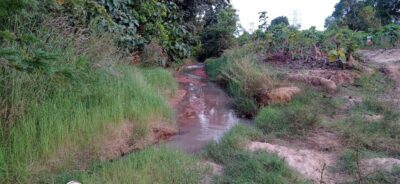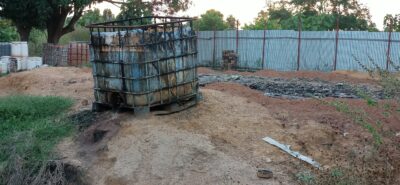
Photo of Ismael Angoh, used with his permission
Within just a few years in 2021, 12 villages in the sub-prefecture of Korhogo (located 635 km from Abidjan in northern Côte d'Ivoire) were left without usable drinking water, due to pollution from the Cotraf oil mill dumping its wastewater in this region. On August 9, 2022, the Ivorian Press Agency (AIP) published an article on this community's frustration, which ultimately caught Ismael Angoh‘s attention. Angoh thereby investigated this issue to highlight the difficulties that communities face in these 12 villages affected by this pollution.
GV: You investigated river pollution caused by a factory’s waste in northern Côte d'Ivoire. What were your motivating factors in this instance?
Ismael Angoh (IA): En Août 2022, j’ai pris part aux formations sur les nouvelles approches d’investigation environnementale sensible au changement climatique organisées par l’Institut Panos Afrique de l’Ouest (IPAO), en partenariat avec le Centre for Investigative Journalism dans le cadre de la mise en œuvre du projet Open Climate Reporting Initiative(OCRI) en Côte d’Ivoire. Par la suite, l’IPAO a lancé un appel à projets d’enquête environnementale. Dans les recherches de sujets, j’ai découvert l’article de l’Agence Ivoirienne de Presse (AIP) dans lequel des populations de 12 villages de Korhogo ont dénoncé, à travers un sit-in, la pollution de leur rivière par des eaux usées de l’huilerie COTRAF. Cet état de fait a provoqué la perte des cultures de riz et un fort taux de mortalité des animaux. Je me suis senti interpellé et j’ai décidé de me pencher sur l’impact de cette pollution sur la vie des autochtones et leurs cours d’eau, leurs récoltes et la faune, de mettre en relief les responsabilités et les mesures entreprises pour y remédier.
Ismael Angoh (IA): In August 2022, as part of the Open Climate Reporting Initiative (OCRI) in Côte d’Ivoire, I undertook training on the new approaches to climate change-related environmental investigations, which the Panos Institute West Africa (IPAO) organized in partnership with the Centre for Investigative Journalism. The IPAO thereby launched an appeal for environmental investigation projects. When looking for research topics, I discovered an Ivorian Press Agency (AIP) article, in which the communities from these 12 Korhogo villages protested against the COTRAF oil mill's wastewater pollution of their river. This situation ultimately led to rice crops being lost and high animal mortality rates. I found this concerning and decided to investigate the impact of this pollution on the lives of natives, their waterways, harvests, and wildlife, thus calling attention to those responsible and the measures taken to address it.

Polluted river in the Lakpolo village (Korhogo). Photo by Ismael Angoh, used with his permission
GV: Eight months on from the publication of your investigation results, have you noticed any changes?
IA: C’est toujours la même situation. Les populations n’ont reçu aucune compensation financière. Elles sont livrées à elles-mêmes. Par contre, l’ONG Jeunes Volontaires pour l’Environnement en Côte d’Ivoire (JVE-CI) m’a contacté suite à mon enquête. Leurs membres projettent de se rendre sur les lieux impactés et de faire un plaidoyer auprès de notre gouvernement et des bailleurs de fonds à l’extérieur du pays si rien n’est fait.
IA: The situation is still the same. The communities haven’t received any financial compensation. They are left to their own devices. However, the Young Volunteers for the Environment in Côte d’Ivoire NGO (Jeunes Volontaires pour l’Environnement en Côte d’Ivoire, or JVE-CI) contacted me following my investigation. Their members plan to visit the impacted sites and appeal to our government and the country’s external donors should no action be taken.

One of Cotraf's makeshift wastewater tanks in the Natio-Kobadara district (Korhogo). Photo by Ismael Angoh, used with his permission
GV: Why did you decide to become an environmental journalist?
IA : D’abord, produire des contenus sur l’environnement ou le changement climatique peut permettre de sauver des vies. Ensuite, couvrir le phénomène peut influer sur l’action politique et donner aux gens la capacité de faire des choix éclairés. Enfin, en réalisant des sujets bien documentés, en tant que journaliste environnementaliste, je peux mettre en lumière les actions que certains mènent d’ores et déjà pour se préparer au changement climatique.
J’espère également travailler avec des ONGs et des médias audiovisuels et en ligne. Par ailleurs, j’aimerais mettre en place une radio et télévision spécialisées en environnement et capable de lutter contre le changement climatique, afin de partager ma petite expérience avec les plus jeunes en matière de journalisme d’investigation.
IA: First, writing content on the environment and climate change can save lives. Second, covering this phenomenon may influence political action and allow people to make informed choices. And last, by working on well documented topics, as an environmental journalist, I can highlight the steps that certain individuals have already taken in preparation for climate change.
I also hope to do some work online, with NGOs and with audiovisual media. Additionally, I would like to establish an environment-related television and radio station to combat climate change, thus sharing my experience in investigative journalism with young people.
GV: What was your career path leading up to this specialization?
IA: Je suis titulaire d’un Diplôme d'Études Supérieures en Communication (DESCOM) et d’un Diplôme Supérieur en Communication (DISCOM) à l’Institut des Sciences et Technique de la Communication (ISTC) Polytechnique à Cocody, à Abidjan. Depuis 2013, je suis journaliste-producteur radio à ISTC FM, 103.8 FM, une radio thématique « Population et Développement », avec laquelle j'ai réalisé des reportages radios et un magazine intitulé “Enfance et Droits”. Ma passion pour les médias m’a amené à me former au métier de Journaliste Reporter d’Images (JRI). Je me suis également intéressé à la presse en ligne et au journalisme d’investigation de données en genre grâce au projet « Médias Lab pour elles » de CFI et au journalisme d’investigation de données en environnement depuis août 2022.
IA: I have a Diploma in Advanced Studies in Communication (DESCOM) as well as a Higher Diploma in Communication (DISCOM) from the Polytechnic Institute of Communication Sciences and Technologies (Institut des Sciences et Technique de la Communication Polytechnique, or ISTC) in Cocody, Abidjan. Since 2013, I have been a broadcast journalist on ISTC FM, 103.8 FM. This is a “Population and Development” themed radio station, where I have produced radio reports and a magazine entitled “Enfance et Droits” (Children and their Rights). My passion for media led me to training as a video journalist. I became interested in online press and gender-based investigative journalism through the French Media Development Agency's (CFI) Media Lab for Women project (Médias Lab pour elles). Since August 2022, I have also been interested in environment-based investigative journalism.
GV: What challenges do you face as an investigative journalist?
IA: Cela fait dix ans que je suis journaliste. Mes principaux challenges se situe à trois niveaux : sur le plan économique, le financement n’est pas à la hauteur de nos espérances pour la réalisation des enquêtes sur des régions souvent reculées de la Côte d’Ivoire. Par exemple, l’enquête sur la pollution des rivières à Korhogo m’a coûté au moins plus de 600 000 FCFA (soit 984 dollars américains). Sur le plan humain, nous sommes confrontés au manque de coopération de certains responsables d’institutions étatiques ou d’entreprises impliquées dans la pollution des rivières des villages de Korhogo. Au niveau logistique, il nous fallait un véhicule de type 4X4 pour rallier les sites de pollution. Pour pallier à ce problème, nous avons loué des motos et nous avons aussi marché. Nous avons également manqué d’équipement technique et scientifique pour prélever des échantillons d’épis de riz et d’eau des rivières polluées. Sur le plan temporel, dans le cadre du projet OCRI, l’Institut Panos nous a fixé un délai de trois mois pour rendre notre enquête mais nous avons mis six mois pour terminer notre travail vu ces difficultés.
IA: I’ve been a journalist for ten years now. I have three main challenges: In economic terms, the funding doesn’t cover our requirements for conducting these investigations in Côte d’Ivoire's often-remote regions. For example, the investigation on river pollution in Korhogo cost me at least FCFA 600,000 (USD 984). In human terms, we have a lack of cooperation from certain state institution leaders and the businesses implicated in the Korhogo villages’ river pollution. In terms of logistics, we required a 4X4 vehicle to reach the polluted sites. To mitigate this problem, we hired some motorbikes and we also walked. There is also a lack of technical and scientific equipment to take samples from the ears of rice and water from the polluted rivers. In terms of time, the Panos Institute set us a three-month deadline to conduct our investigation as part of the OCRI Project. However, in light of these difficulties, it took us six months to complete our work.
GV: What does a journalist covering this issue need to do to make it publicly available?
IA: Il faut diffuser les résultats du travail sur les médias classiques et nouveaux. En ce qui concerne mon enquête, je l’ai diffusé sur ISTC FM, 103.8 FM. Je l'ai relayée sur www.vocaroo.com, un site de podcast, sur LinkedIn et WhatsApp. L’enquête a été partagée avec ceux ou celles qui ont témoigné lors de nos interviews, avec des ONGs et mes confrères. J’ai aussi parlé de l’enquête dans l’émission “ Panorama des Régions sur la radio de la Paix”.
IA: They should use conventional and new media alike to broadcast their investigation results. I aired my investigation on ISTC FM, 103.8 FM and broadcast it on the podcast website, www.vocaroo.com, LinkedIn and WhatsApp. The investigation was also shared with those who provided statements during our interviews, NGOs, and my colleagues. I also spoke about this investigation on the “Panorama des Régions” (Regions Overview) Program on Peace Radio.
GV: Do you work within a network of journalist colleagues on the same issues in Côte d’Ivoire?
IA: Je rêve de travailler en réseau avec d’autres confrères journalistes sur la même thématique en Côte d’Ivoire, dans la sous-région, mais pour le moment, ma vraie collaboration, c’est avec la journaliste Aïssatou Fofana. Grâce à elle, j’ai pu relayé mon enquête sur son site en ligne : www.lecologiste.com.
IA: I would love to work within a network of journalist colleagues on the same issues in Côte d’Ivoire, in the sub-region. But, for now I’m working with the journalist, Aïssatou Fofana. Thanks to her, I was able to share my investigation on her website: www.lecologiste.com.
GV: What is your view on the environmental struggle?
IA: Je compte renforcer mes capacités sur le journalisme d’investigation et le journalisme de solutions pour lutter contre le changement climatique. Les responsables des médias doivent comprendre que cette thématique représente pour eux une occasion de se développer et d’améliorer leur offre en direction du public. Parce que les populations veulent obtenir des informations fiables sur le phénomène et savoir ce qu'elles peuvent faire pour contribuer à la lutte.
IA: I intend to strengthen my skills in investigative and solutions journalism to combat climate change. Mediapersons need to understand that this issue is an opportunity for them to expand and improve what they have on offer to the public. People want to receive reliable information on this phenomenon to understand where they can assist.






